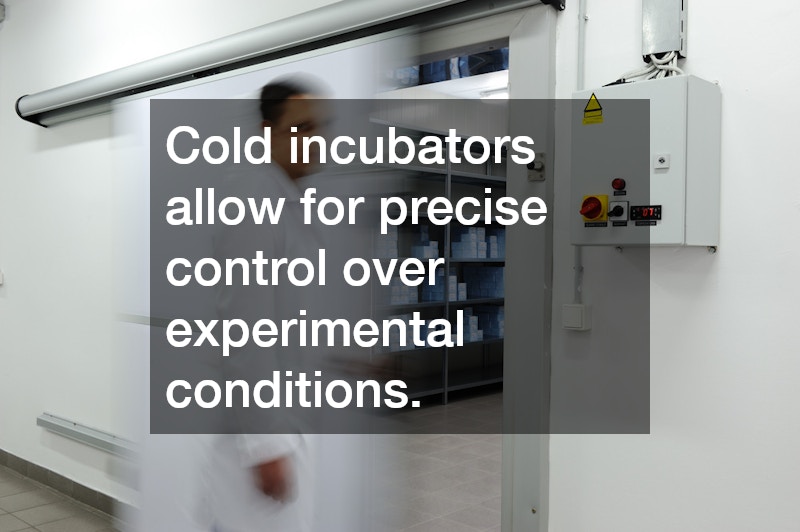Top Uses for Cold Incubators

Cold incubators are essential tools in scientific research and industrial applications. They provide a controlled environment for various processes requiring low temperatures. By maintaining precise temperature conditions, cold incubators enhance both experimental and industrial processes, contributing to more accurate outcomes and efficient operations.
How Do Cold Incubators Work?
Temperature Regulation
Cold incubators utilize precise temperature control systems to maintain a stable low-temperature environment essential for various experiments. These systems typically employ sensors, thermostats, and cooling mechanisms that work together to ensure the desired temperature is consistently maintained. This precision is vital in many research and industrial settings where temperature fluctuations could adversely affect outcomes.
In more advanced models, cold incubators are equipped with microprocessor-based controllers. These controllers allow for refined adjustments, ensuring the most sensitive experiments are conducted under optimal conditions. Such sophistication is crucial in high-stakes environments such as pharmaceutical research and delicate biological studies.
Applications in Biological Research
Cold incubators are widely used in biological research for preserving samples, growing cultures at low temperatures, and conducting temperature-sensitive experiments. They offer an ideal environment for the storage and longevity of biological samples, preventing degradation by maintaining cold, stable conditions. This capability is particularly essential for the preservation of DNA, RNA, and protein samples.
Apart from preservation, cold incubators support the growth of organisms that thrive in lower temperatures. This includes certain strains of bacteria and fungi that are crucial for biotechnological research and industrial applications. The ability to culture such microorganisms at optimal temperatures expands the scope of research possibilities in microbiology.
Energy Efficiency
Modern cold incubators are designed to be energy efficient, using advanced insulation and temperature control methods to minimize power consumption while maintaining consistent temperatures. High-performance insulation materials reduce heat loss and thermal conduction, ensuring maximum energy retention within the incubator. Such efficiency translates to significant energy savings over prolonged use.
Many cold incubators also come with energy-saving modes that further optimize power usage. These modes allow the incubator to adapt its energy consumption based on the external environment and usage patterns. Incorporating these features demonstrates the manufacturers’ commitment to sustainability and cost-effectiveness.
What Are the Benefits of Using Cold Incubators?
Preservation of Perishable Samples
One of the key benefits of cold incubators is their ability to preserve perishable samples by preventing the growth of unwanted microorganisms. The low temperatures impede bacterial and fungal growth, which can otherwise spoil samples and compromise experiment results. This preservation capability is invaluable for laboratories that require long-term storage of sensitive biological materials.
In the food and beverage industry, cold incubators help preserve quality and extend the shelf life of products. This not only protects the integrity of the products but also reduces waste and loss. The biomedical field similarly relies on cold incubators to store vaccines and other temperature-sensitive pharmaceuticals, ensuring their efficacy and safety.
By preventing the degradation of samples and products, cold incubators support continuity in research and industrial processes. Their reliability reduces the need for repeated experiments due to sample spoilage, ultimately saving time and resources. This advantage is critical for ongoing research, especially in fields with time-sensitive applications.
Enhanced Experiment Accuracy
Cold incubators allow for precise control over experimental conditions, leading to more reliable and replicable results in scientific studies. This precision eliminates variables related to temperature fluctuations, which could skew data and impact experiment integrity. With consistent conditions, researchers can trust their results and draw accurate conclusions.
Additionally, the controlled environment of cold incubators reduces the chances of contamination and external influences. This is crucial for maintaining sample purity, particularly in microbiology and molecular biology research. The enhanced accuracy facilitates advancements in scientific understanding and innovation.
The reliability of cold incubators is further evident in their widespread application across diverse research fields. From clinical trials to environmental studies, the ability to regulate temperature with unparalleled accuracy underpins critical discoveries and technological progress. Researchers can confidently explore new frontiers, knowing they have a dependable tool in cold incubators.
Cold incubators play a crucial role in modern science and industry by providing controlled low-temperature environments for experiments and applications. Understanding how they work and the benefits they offer is essential for maximizing their potential in various fields. Their precision in temperature regulation, energy efficiency, and versatility make them invaluable across research and industrial domains, ensuring continuous advancement and innovation.
.

